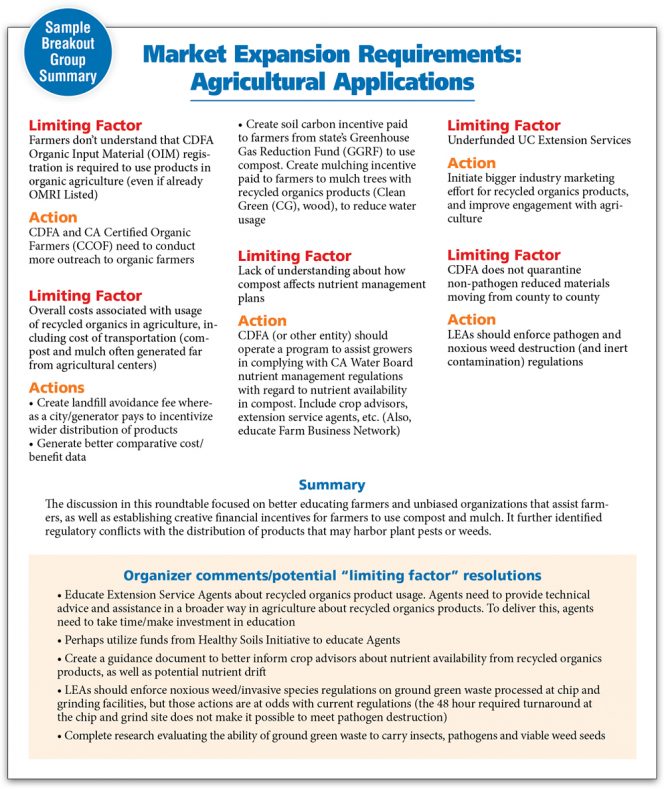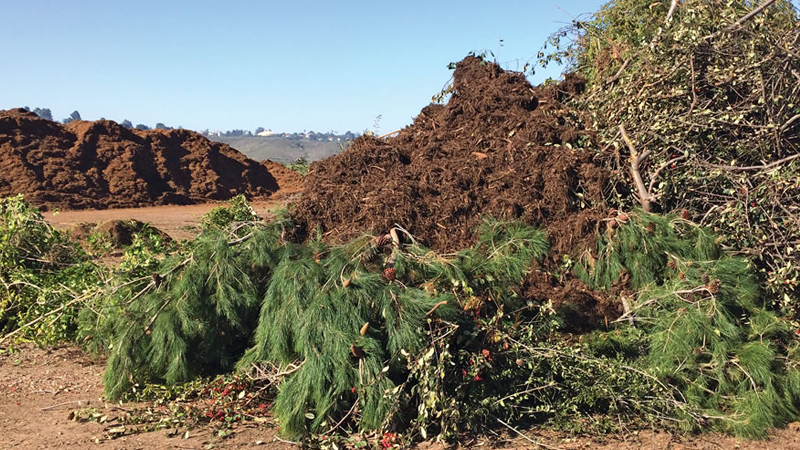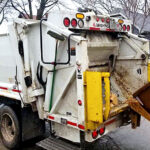Ron Alexander and Nora Goldstein
California is the most populous state in the union, possesses a huge economy, and is typically considered one of the “greenest” states. In 2016, California enacted climate change regulations — Senate Bill 1383 — that will significantly impact how organic wastes are managed in the State, greatly increasing the rate of recycling and recovery. Key elements take effect in 2020 and 2022 (see sidebar), leaving the state a limited amount of time to implement its important plan.
This reality places California in a national leadership role for organics recovery and recycling. To reach its goals, California will not only be required to increase its organics recycling infrastructure, but also markets for compost, digestate and woody materials. Of course, this will have to occur within regulatory and other “human nature” (e.g., NIMBYism, willingness to properly source separate) related realities.
In recognition of SB 1383’s potential to result in a significant influx of recycled organics products into the market, a BioCycle West Coast18 workshop was organized on March 26, 2018 by BioCycle and R. Alexander Associates, Inc. titled “Compost & Digestate Volumes Are Increasing — Are California Markets Ready?” Close to 90 individuals involved in the California organics recycling industry, including those representing related State agencies, worked together using their experience and knowledge to identify industry gaps and logjams that negatively impact industry expansion, while identifying “actionable” policies, regulations, research, and market incentives that can be utilized to enhance market development for the recovered products. The overarching goal of the event was to gain insight from practitioners within the California organics recycling industry, and use it to develop a list of Actions (including areas of assistance) necessary for the organics recycling industry to assist the state in reaching its legislative mandates.
The Workshop format included:
- Short background presentations to outline the current status of California’s organics recycling industry, followed by some initial discussions with all participants
- Breakout groups/roundtable discussions on specific topics, which identified current roadblocks and potential solutions to them (these were noted as limiting factors and actions, respectively in the Breakout group summaries)
- Information to be distilled and reported back to the entire group by the breakout group leaders
There were five Breakout Groups:
- Regulatory Requirements/Issues
- Market Expansion Requirements: Agricultural Applications
- Market Expansion Requirements: Non-Agricultural Applications
- Government Initiatives to Enhance Compost, Digestate and Mulch Market Expansion
- and Product Quality & Contamination.
Following the Workshop, the limiting factors and actions were further refined, then compiled into a brief report to facilitate dissemination. Below is an example of how the results of one of the Breakout Groups are presented in the report.
 Next Steps
Next Steps
This BioCycle West Coast18 Workshop initiated a focused discussion on current California markets for compost, digestate and mulch, and compiled critical next steps to grow markets to consume the expected increasing volumes of those products. The day-long process identified and documented what the California organics recycling industry — including composters, digesters and chip and grind operations — requires to significantly, and profitably, expand end markets.
Next steps identified by Workshop participants include:
- Provide the Workshop summary to California government regulatory and nonregulatory officials (state, regional and local), and state legislators. This document illustrates that the organics recycling industry has an understanding of the necessary requirements to meeting State organics recycling legislation and regulations.
- Schedule a meeting of key organics recycling stakeholder groups to help facilitate development of a Regulator Summit on how to level the regulatory “playing field” for various categories of organics recycling operations, and identify appropriate enforcement mechanisms for each category.
- Draft regulatory, legislative, Model Ordinance, and/or contract language to encapsulate specific actions recommended in this Workshop summary document.
- Encourage open dialogue among entities working towards organics recycling goals, including regulators, which can reduce regulatory overlap.
- Draft sample outreach, education and training materials for end users of recycled organic products and circulate them among agricultural extension agents, local enforcement agencies, etc.
- Creating incentives and/or requirements for using our environmentally preferred recycled organics products.
Hopefully, these efforts also enable the California composting industry to discuss its requirements in a uniform way. The summary document is designed to facilitate implementation of the Actions discussed by Workshop participants. It is assumed that the identified Actions will be refined for and by various stakeholder groups, including regulators, legislators, educators, and end users of recycled organic products.
Authors and Workshop Facilitators: Ron Alexander, President of R. Alexander Associates, Inc. entered the organics recycling industry in 1984, working as a compost salesperson, then marketing manager. He is currently President of R. Alexander Associates, Inc., a consulting company specializing in product and market development for organic recycled products. He has been involved on California organics recycling projects for over 25 years. Mr. Alexander is the author of the ‘The Practical Guide to Compost Marketing and Sales’, and has assisted Caltrans and many other California specifying entities (ron@alexassoc.net; www.alexassoc.net). Nora Goldstein is Editor of BioCycle.













